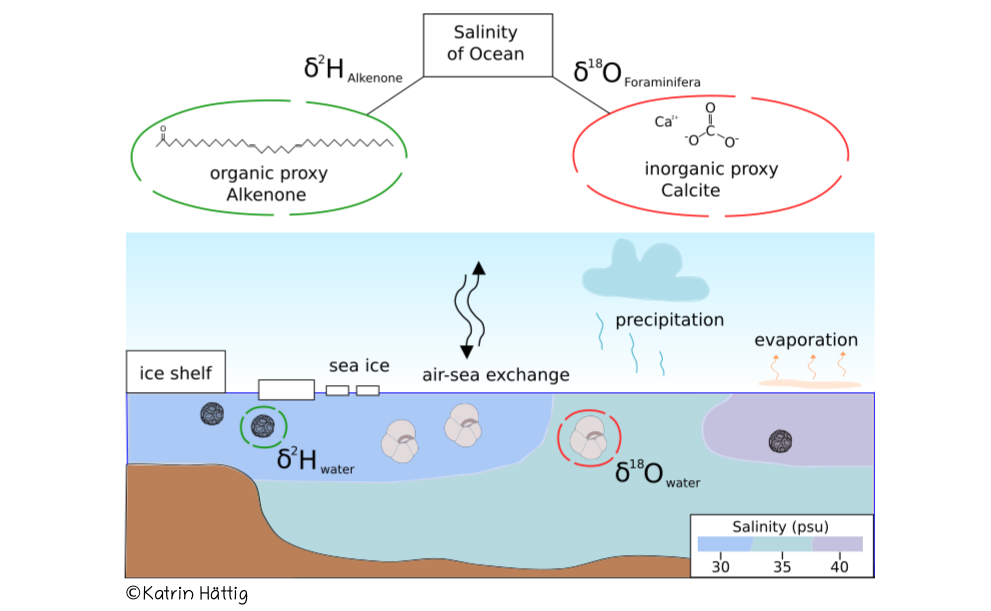Inactive user
The page you are trying to access has been deactivated because Hättig is not working for NIOZ anymore.
Go to Staff.
Research Interest
Aim of my phd-project is the reconstruction of ancient seawater isotopes using the hydrogen isotopic composition of organic biomarkers and oxygen isotopic composition of biological calcites. The project is within the Netherlands Earth System Science Center (NESSC) and supervised by Marcel van der Meer.
To understand future climate change, it is helpful to be able to reconstruct past climate change and its impact on the environment. Paleosalinity , which is correlated with the seawater isotopes, is one of the most important oceanographic parameters which cannot be reconstructed with reasonable accuracy based on sedimentary records yet.
One tool to reconstruct paleoenvironmental conditions is to measure stable isotopes on fossilized biological material. Oxygen isotopes of calcitic shells reflect the ambient temperature and salinity of the seawater dependent on fractionation processes. Culture studies showed that hydrogen isotopic fractionation of phototrophic organisms depends heavily on salinity, this makes algal and bacterial biomarker lipids potentially applicable paleosalinity proxies. Several environmental studies demonstrated the application of hydrogen isotope composition of the C37:2 and C37:3 alkenones, produced by Haptophyte algae (i.e. Emiliana huxleyi), for this purpose.
I want to conduct multiproxy research using both oxygen and hydrogen isotope ratios measured on sediment core samples from the same depth but on different organisms, in order to more confidently reconstruct ambient water isotope shifts, and therefore, changes in salinity during the Cenozoic.

Education
10/2017-02/2020
Master of Geosciences at the University of Bremen, Germany
Focus: Biogeochemistry, Sedimentology and Micropaleontology
Master thesis: Effects of diagenesis on benthic and planktic foraminiferal radiocarbon ages in the Eurasian Basin (Arctic Ocean)
10/2014– 07/2017
Bachelor of Geosciences at the Ruhr-University Bochum, Germany
Focus: Geochemistry, Marine Geology and Geodynamics
Bachelor thesis: Microstructure and Geochemistry of recent and fossil shark teeth
Work experience & projects
03/2019-04/2019
Research cruise MSM82, Rio Grande Rise
10/2017-12/2019
Forarex – FORAminifera Rocket Experiment, project cycle 11 of the REXUS/BEXUS Programme
10/2018-12/2018
Internship in the Waikato Environmental Geochemistry (WEG) group, University of Waikato, New Zealand
12/2017-08/2018
Student Assistant in the research group “Organic Geochemistry” MARUM, University of Bremen, Germany
03/2017-09/2017
Student Assistant in the research group “Paleontology” GMG, Ruhr-Universität Bochum